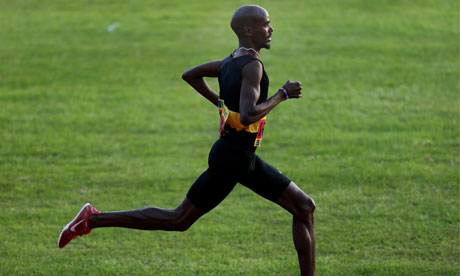By Adam Dinham
University leadership needs to engage in better debate about religion in order to best serve their staff and students of all faiths

When it comes to religious literacy, higher education still has big strides to make.
Photograph: Steven Paston/Action Images
People will be talking about Mo Farah's Olympic triumph in the men's 10,000m for days to come. Rarely commented upon, however, is the fact his achievement coincides with Ramadan, when Muslims traditionally fast from sunrise to sunset and follow a discipline of prayer and dedication which can be highly demanding, both of mind and body. This presents a massive challenge to Muslim athletes, and many – Mo among them – decided to excuse themselves from fasting this year after careful discussion with family, friends and clerics.
Students around the world will face a similar dilemma next year when Ramadan falls in the middle of university and school exam periods. What, if anything, should educators be doing about this? The Religious Literacy Leadership Programme, which works with university vice-chancellors, staff, sector leaders and students to develop outlooks and strategies that engage positively with faith, appreciates this challenge more than most.
'Religious literacy' has become a talking point since we lost the ability to talk about religion when we needed it most. Billions of people around the world are religious, despite secularism's expectation that religion would have declined to vanishing point by now. Migration and globalisation mean that we all encounter the full range of religious beliefs – and non-beliefs – in everyday life, as voters, volunteers, service users, partners, leaders, and educators.
How well do we handle those encounters? This is an important question, not just for universities and not just during Ramadan, but for all religious traditions, faiths and beliefs in all sectors and settings. Liberalism's answer has been to rise above the fray, to insist on neutrality in shared public space, in the hope the debates will go away. The rise of Islamophobia in the aftermath of 9/11 and 7/7 show this approach to be inadequate. As do the millions of volunteer hours and pounds contributed by faith-based social action and community initiatives, which represent a missed opportunity for those who choose to ignore them. We need a renewed public language for public faith.
The exams during Ramadan issue is a good example of why. Come exam time for the next few years, Muslims everywhere will be waking at 4am to eat breakfast before the sun comes up. These meals can be hearty affairs and many people will carry on with their days from there. The dilemma for stressed-out students, with one or maybe two exams in the day, is whether to snatch a little sleep there or then, or wait for an opportunity for forty winks later in the day. The alternative – and the one which usually plays out – is simply to plough on so that by the middle of the afternoon exam many of these students are pie-eyed with exhaustion, hunger and thirst. These are not the best conditions for performance. Dinner has to wait till the end of the long summer day and it's a case of late night eating, sleeping on full stomachs, and waking again before dawn. These are not ideal conditions for any student.
How then can universities prepare for this? Their choice of approach will depend on wider attitudes towards religion, both inside and outside higher education. Some institutions will make no accommodations. Others will bend over backwards to provide an atmosphere of care and support for their students. In universities with big Muslim populations, like University of Bradford, there will be a compelling sense of the issues and which practical measures might help. In those with very limited diversity, the issue may seem all but irrelevant.
The advice which the Religious Literacy Leadership Programme will issue in the autumn proposes a common sense approach, rooted in open discussion with religious students and staff about what seems most reasonable, and with local Muslim groups and Imams to hear how they might be able to help out. These don't need to be big, formal engagements: forging warm, local relationships will help build up the knowledge and resilience required. And in the vast majority of cases, a common sense approach will lead to a common sense response.
Whatever the practical solutions, it is crucial that we get better at thinking about religion. Kneejerk reactions, semi-conscious hostility or tired narratives about its role in conflict and conversion simply won't do. Those attitudes belong to another century. Knowing a bit about the lived experience of religious identity is as important to demystifying the 'other' as race discourse has been to nurturing ethnic diversity in our institutions. Surfacing our often ambivalent and muddled feelings about religion will also be important in order to crack open a more good-tempered, well-informed discussion.
In short, we need to improve the debate significantly – not more religion, but a better quality of conversation about religion, for all of our students, of all faiths (and none).
Adam Dinham is professor of faith and public policy and director of the Faiths & Civil Society Unit at Goldsmiths, University of London.
Source: The Guardian
No comments:
Post a Comment